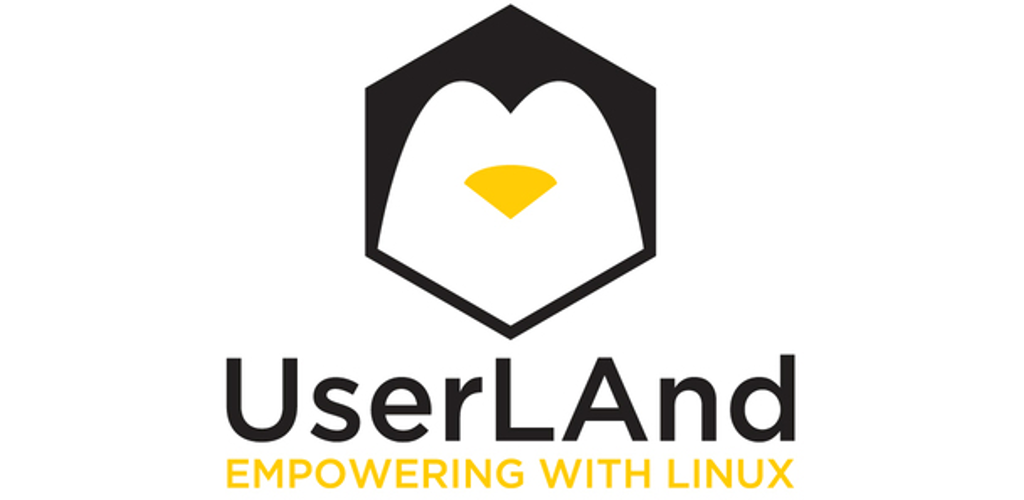Top Related Projects
Termux - a terminal emulator application for Android OS extendible by variety of packages.
Install and run GNU/Linux on Android
Haven is for people who need a way to protect their personal spaces and possessions without compromising their own privacy, through an Android app and on-device sensors
Quick Overview
UserLAnd is an open-source Android app that allows users to run Linux distributions on their Android devices without requiring root access. It provides a user-friendly interface for installing and managing various Linux distributions, enabling users to run command-line tools and graphical applications directly on their Android devices.
Pros
- No root access required, making it accessible to a wide range of Android users
- Supports multiple Linux distributions, including Ubuntu, Debian, and Alpine
- Offers both command-line and graphical user interface options
- Provides a seamless integration between Android and Linux environments
Cons
- Performance may be limited compared to native Linux installations
- Some advanced features may require additional configuration or workarounds
- Limited hardware support for certain devices or Android versions
- May consume significant storage space and system resources
Getting Started
To get started with UserLAnd:
- Install the UserLAnd app from the Google Play Store or build it from source.
- Open the app and select a Linux distribution to install.
- Choose between CLI or GUI session types.
- Follow the on-screen instructions to set up your Linux environment.
- Once installed, you can launch your Linux session and start using Linux applications on your Android device.
For more detailed instructions and troubleshooting, refer to the project's GitHub repository and documentation.
Competitor Comparisons
Termux - a terminal emulator application for Android OS extendible by variety of packages.
Pros of Termux
- More mature and established project with a larger user base and community
- Offers a wider range of packages and tools through its package manager (APT)
- Better performance and resource efficiency on Android devices
Cons of Termux
- Steeper learning curve for beginners due to command-line interface
- Limited graphical application support compared to UserLAnd
- Requires more manual configuration for certain advanced features
Code Comparison
UserLAnd (Java):
public void setUpSession() {
session = new Session(this, filesystemId, serviceType);
session.addStateListener(this);
session.start();
}
Termux (Java):
public void initializeSession() {
mTerminalSession = new TerminalSession(mEmulator, this, this, mTerminalCwd);
mTerminalSession.setTitle(mSessionName);
mTermSession.setFinishCallback(this);
}
Both projects use Java for their Android applications, but their session initialization methods differ. UserLAnd's approach seems more focused on filesystem and service type, while Termux's implementation is centered around terminal emulation and session management.
Install and run GNU/Linux on Android
Pros of linuxdeploy
- More lightweight and resource-efficient
- Supports a wider range of Linux distributions
- Offers more advanced configuration options for experienced users
Cons of linuxdeploy
- Less user-friendly interface, requiring more technical knowledge
- Limited built-in app support compared to UserLAnd
- Less frequent updates and maintenance
Code Comparison
UserLAnd (Kotlin):
override fun startSession(session: Session, serviceType: String) {
val serviceIntent = Intent(this, ServerService::class.java)
serviceIntent.putExtra("type", serviceType)
serviceIntent.putExtra("session", session)
startService(serviceIntent)
}
linuxdeploy (Java):
public void deploySystem(String distro, String arch) {
Intent intent = new Intent(this, InstallService.class);
intent.putExtra("distro", distro);
intent.putExtra("arch", arch);
startService(intent);
}
Both projects use Android's Intent system to start services, but UserLAnd focuses on session management while linuxdeploy emphasizes system deployment. UserLAnd's code is in Kotlin, while linuxdeploy uses Java, reflecting their different development approaches.
Haven is for people who need a way to protect their personal spaces and possessions without compromising their own privacy, through an Android app and on-device sensors
Pros of Haven
- Focused on personal security and privacy, providing a unique solution for mobile device surveillance
- Utilizes device sensors for comprehensive monitoring and threat detection
- Open-source project with a strong emphasis on user privacy and data protection
Cons of Haven
- More specialized use case compared to UserLAnd's general-purpose Linux environment
- Potentially higher battery consumption due to continuous sensor monitoring
- Steeper learning curve for non-technical users
Code Comparison
Haven (Java):
public class AccelerometerMonitor implements SensorEventListener {
@Override
public void onSensorChanged(SensorEvent event) {
// Process accelerometer data
}
}
UserLAnd (Kotlin):
class SessionListViewModel(private val sessionDao: SessionDao) : ViewModel() {
val allSessions: LiveData<List<Session>> = sessionDao.getAllSessions()
fun insertSession(session: Session) = viewModelScope.launch {
sessionDao.insertSession(session)
}
}
While both projects are open-source and focus on mobile device functionality, Haven is tailored for security monitoring, whereas UserLAnd provides a Linux environment on Android. Haven's code deals with sensor data processing, while UserLAnd's code manages user sessions for Linux environments.
Convert  designs to code with AI
designs to code with AI

Introducing Visual Copilot: A new AI model to turn Figma designs to high quality code using your components.
Try Visual CopilotREADME

Welcome to UserLAnd
The easiest way to run a Linux distribution or application on Android.
Features:
- Run full linux distros or specific applications on top of Android.
- Install and uninstall like a regular app.
- No root required.
Have a bug report or a feature request?
You can see our templates by visiting our issue center.
Want to contribute?
See our CONTRIBUTING document.
Start using UserLAnd
See our Getting Started page.
UserLAnd assets
The assets that UserLAnd depends on and the scripts that build them are contained in other repositories.
The common assets that are used for all distros and application are found at CypherpunkArmory/UserLAnd-Assets-Support.
Distribution or application specific assets are found under CypherpunkArmory/UserLAnd-Assets-(Distribution/App). For example, our Debian specific assets can be found at CypherpunkArmory/UserLAnd-Assets-Debian
Top Related Projects
Termux - a terminal emulator application for Android OS extendible by variety of packages.
Install and run GNU/Linux on Android
Haven is for people who need a way to protect their personal spaces and possessions without compromising their own privacy, through an Android app and on-device sensors
Convert  designs to code with AI
designs to code with AI

Introducing Visual Copilot: A new AI model to turn Figma designs to high quality code using your components.
Try Visual Copilot